Local and Remote Failure Protection
- Primary Failures to Tolerate (PFTT) defines the number of sites that can accept failure (0,1).
- Secondary Failures to Tolerate (SFTT) define the number within a site that can accept failure (0,1,2,3).
- When a stretched cluster is not configured (PFTT=0), PFTT behaves the same as FTT, and SFTT will not be shown as a rule.
- When a stretched cluster is configured (PFTT=1):
- RAID-1 is used to provide replication across 2 sites
- Within a site, SFTT dictates if each replica is mirrored (RAID-1) or uses erasure coding (RAID 5/6).
Site Affinity
The ability to pin specific sets of data (Virtual Machines) to 1 particular site. Use cases may be:
- Test / Development
- Application aware redundancy (Active Directory, Exchange, SQL).
If you specify single site location of VM components if site-level protection is unnecessary (PFTT=0). This policy is driven by the SPBM (Storage Policy Based Management). Site affinity also reduces network and storage requirements since there’s no data to transfer between sites AND there’s no need to replicate the data components, thus which saves on storage costs.
Source: VMware vSAN and HCI Fundamentals course



how to perform DR for the VMs in vSAN stretched cluster ?
Use VMware Site Recovery Manager (SRM) with VMware Replication or use 3rd party array based replication.